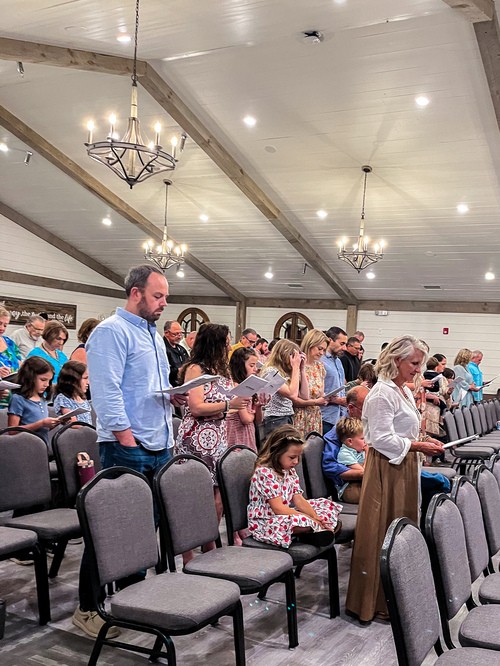Why Church Membership?

Power struggles. Bureaucratic inefficiency. Favoritism and exclusion on unbiblical grounds. Chances are, you’ve heard stories of church memberships that were plagued by these realities. Maybe you’ve experienced one personally…
With examples such as these, I can certainly understand why people are nervous – even skeptical – about the concept of a formal church membership. But here’s why I am convinced that church membership is one of the greatest gifts that Christ has given to his people.
With examples such as these, I can certainly understand why people are nervous – even skeptical – about the concept of a formal church membership. But here’s why I am convinced that church membership is one of the greatest gifts that Christ has given to his people.
What is church membership?
According to the Bible, church membership is the normal means through which the Lord Jesus Christ builds his church. Stated differently, church membership is the way that Jesus has chosen to make his not-yet-visible Kingdom visible and “fleshy” on Earth. We see this truth first articulated in Matthew 16:16-19.
After the Apostle Peter confesses Jesus as “The Christ” (God’s final King) and “Son of the Living God,” Jesus acknowledges that Peter’s confession is correct: “Blessed are you!” Then, Jesus raises the stakes, when he says (in Matthew 16:18-19, ESV, emphasis added): "And I tell you, you are Peter, and on this rock I will build my church, and the gates of hell shall not prevail against it. I will give you the keys of the kingdom of heaven, and whatever you bind on earth shall be bound in heaven, and whatever you loose on earth shall be loosed in heaven.”
After hearing his right confession of faith, Jesus says to Peter, “I am going to build my church upon you and upon people like you: people who make the right confession about me. The realm of the dead will not be able to hold back those who place saving faith in me as Lord and Savior. They will permanently cross out of death into abundant, eternal life in me.”
“Whoa, whoa, whoa,” you might be thinking. “Jesus was only talking to Peter in Matthew 16! How can you conclude he also is speaking of people who would later make the same confession as Peter?” Because just two chapters after Peter’s confession, Jesus makes this statement in Matthew 18:15-20 (ESV, emphasis added):
“If your brother sins against you, go and tell him his fault, between you and him alone. If he listens to you, you have gained your brother. But if he does not listen, take one or two others along with you, that every charge may be established by the evidence of two or three witnesses. If he refuses to listen to them, tell it to the church. And if he refuses to listen even to the church, let him be to you as a Gentile and a tax collector. Truly, I say to you, whatever you bind on earth shall be bound in heaven, and whatever you loose on earth shall be loosed in heaven. Again I say to you, if two of you agree on earth about anything they ask, it will be done for them by my Father in heaven. For where two or three are gathered in my name, there am I among them.”
Notice that, in Matthew 18, the same authority which was initially given to Peter – the authority to bind and loose on earth as it is in heaven – is now vested in an assembled group of people: the church. What then does this “binding” and “loosing” mean? In his very helpful (and very short!) book entitled Understanding the Congregation’s Authority, Jonathan Leeman offers a helpful answer, which is summarized below.
Churches don’t make the gospel what it is, and they don’t make a person a Christian or not. But using the standard of Peter’s confession in Matthew 16, churches determine whether or not a person’s confession of faith is genuine and in-line with God’s standards in the Bible. And following the process outlined in Matthew 18, churches evaluate the authenticity of that confession: whether or not the fruit of the Spirit is present in his/her life (cf. Galatians 5:22-33).
Where an assembly of two or three (or more) agree that a person exhibits a right confession and a right lifestyle which accompanies that confession, the Father himself authorizes that church to declare to the world, “This person is a believer in Jesus Christ.”
Similarly, where an assembly of two or three (or more) is in agreement that a person’s confession is not right, or that a person’s lifestyle is inconsistent that of Jesus Christ, the Father authorizes the church to exhort that individual: “We don’t think you are a believer in Jesus – here’s why. Repent and believe in the gospel…”
After the Apostle Peter confesses Jesus as “The Christ” (God’s final King) and “Son of the Living God,” Jesus acknowledges that Peter’s confession is correct: “Blessed are you!” Then, Jesus raises the stakes, when he says (in Matthew 16:18-19, ESV, emphasis added): "And I tell you, you are Peter, and on this rock I will build my church, and the gates of hell shall not prevail against it. I will give you the keys of the kingdom of heaven, and whatever you bind on earth shall be bound in heaven, and whatever you loose on earth shall be loosed in heaven.”
After hearing his right confession of faith, Jesus says to Peter, “I am going to build my church upon you and upon people like you: people who make the right confession about me. The realm of the dead will not be able to hold back those who place saving faith in me as Lord and Savior. They will permanently cross out of death into abundant, eternal life in me.”
“Whoa, whoa, whoa,” you might be thinking. “Jesus was only talking to Peter in Matthew 16! How can you conclude he also is speaking of people who would later make the same confession as Peter?” Because just two chapters after Peter’s confession, Jesus makes this statement in Matthew 18:15-20 (ESV, emphasis added):
“If your brother sins against you, go and tell him his fault, between you and him alone. If he listens to you, you have gained your brother. But if he does not listen, take one or two others along with you, that every charge may be established by the evidence of two or three witnesses. If he refuses to listen to them, tell it to the church. And if he refuses to listen even to the church, let him be to you as a Gentile and a tax collector. Truly, I say to you, whatever you bind on earth shall be bound in heaven, and whatever you loose on earth shall be loosed in heaven. Again I say to you, if two of you agree on earth about anything they ask, it will be done for them by my Father in heaven. For where two or three are gathered in my name, there am I among them.”
Notice that, in Matthew 18, the same authority which was initially given to Peter – the authority to bind and loose on earth as it is in heaven – is now vested in an assembled group of people: the church. What then does this “binding” and “loosing” mean? In his very helpful (and very short!) book entitled Understanding the Congregation’s Authority, Jonathan Leeman offers a helpful answer, which is summarized below.
Churches don’t make the gospel what it is, and they don’t make a person a Christian or not. But using the standard of Peter’s confession in Matthew 16, churches determine whether or not a person’s confession of faith is genuine and in-line with God’s standards in the Bible. And following the process outlined in Matthew 18, churches evaluate the authenticity of that confession: whether or not the fruit of the Spirit is present in his/her life (cf. Galatians 5:22-33).
Where an assembly of two or three (or more) agree that a person exhibits a right confession and a right lifestyle which accompanies that confession, the Father himself authorizes that church to declare to the world, “This person is a believer in Jesus Christ.”
Similarly, where an assembly of two or three (or more) is in agreement that a person’s confession is not right, or that a person’s lifestyle is inconsistent that of Jesus Christ, the Father authorizes the church to exhort that individual: “We don’t think you are a believer in Jesus – here’s why. Repent and believe in the gospel…”
What does this look like at Autumn Ridge Community Church?

At Autumn Ridge Community Church, we’ve structured our membership process to promote the “agreement” that is necessary for us to “bind” and “loose” on earth in accordance with the will of Jesus Christ. This decision is consistent with Scripture and draws upon the same wisdom that has been employed by the majority of churches throughout the ages.
In our Membership Class, we discuss, “What is the gospel?” because a right understanding of the good news of Jesus is essential for us to rightly assess whether or not a person’s confession of faith is genuine. We discuss, “What do we believe?” because the members of our church must be in agreement on what practices, lifestyles, and beliefs rightly accompany a genuine confession of faith. We discuss, “What makes us different from other churches?” because we want our members to agree on the rhythms and distinctives we will prioritize as a church family.
After the class, our leaders then sit down with potential members; we hear the particulars of their confessions of faith, we ask about whether or not there is tangible evidence of a walk with Jesus, and we discuss whether or not there are any disagreements which might threaten the long-term unity of our church. Provided that the potential members have a right confession accompanied with a lifestyle of Christ-likeness, our church body as a whole has the opportunity to affirm, “Yes – this is a genuine believer. And yes – he/she lives a lifestyle that adorns the reality of the gospel.”
In our Membership Class, we discuss, “What is the gospel?” because a right understanding of the good news of Jesus is essential for us to rightly assess whether or not a person’s confession of faith is genuine. We discuss, “What do we believe?” because the members of our church must be in agreement on what practices, lifestyles, and beliefs rightly accompany a genuine confession of faith. We discuss, “What makes us different from other churches?” because we want our members to agree on the rhythms and distinctives we will prioritize as a church family.
After the class, our leaders then sit down with potential members; we hear the particulars of their confessions of faith, we ask about whether or not there is tangible evidence of a walk with Jesus, and we discuss whether or not there are any disagreements which might threaten the long-term unity of our church. Provided that the potential members have a right confession accompanied with a lifestyle of Christ-likeness, our church body as a whole has the opportunity to affirm, “Yes – this is a genuine believer. And yes – he/she lives a lifestyle that adorns the reality of the gospel.”
Why is biblical church membership good news?
Biblical church membership can come across as restrictive or manipulative – especially to someone who has been burned by a “Church Membership Gone Wild” in the past. But keep in mind the reasons Jesus originally instituted church membership.
For all of these reasons – and for many more – I hope you’ll commit to meaningful membership in a Bible-believing local church.
- Biblical church membership prevents churches from playing favorites – because the standards for membership are defined by God through the Bible, not by biased men of the cloth.
- Biblical church membership offers a system of “checks and balances” against corrupt leaders, because the church as a whole is empowered – not just those who hold formal leadership positions.
- Biblical church membership strengthens and affirms a church’s members, even on those members’ worst days. “I know you’re going through a rough patch right now, but remember when we all affirmed your confession of faith and the fact that the Holy Spirit was at work in your life? Those things are still true of you!”
- And, biblical church membership is an essential tool for evangelism and disciple-making. The discipline process of Matthew 18 is not intended to stop at the exclusion of non-believers. Rather, Matthew 18:15-20 guides the church to identify who has yet to experience salvation through Christ – and to labor in the gospel towards their full inclusion into God’s family. Jesus Christ has equipped his church to go to people of all tribes, tongues, nations, and languages, and say, “It looks like you are living a life devoid of God’s grace through Christ. Come: taste and see that the Lord is good (Psalm 34:8).”
For all of these reasons – and for many more – I hope you’ll commit to meaningful membership in a Bible-believing local church.
* Photo by Robin Spielmann on Unsplash
